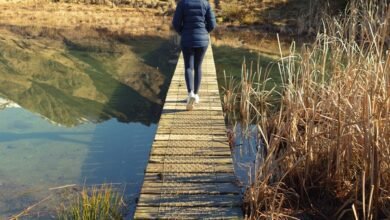Urban life hums with an unrelenting rhythm. The constant buzz of traffic, the glare of neon lights, and the unending stream of notifications create an environment where silence and stillness feel foreign. For many, the modern pace has become synonymous with fatigue, anxiety, and disconnection.
The search for reprieve often leads people back to where balance naturally exists—within nature. Places like the Smoky Mountains, TN, have become symbols of this return, offering landscapes where stress dissolves and presence takes root. In recent years, retreats into natural settings have gained renewed importance, not merely as leisure trips but as scientifically supported pathways to restore mental and physical well-being.
In this article
Finding Balance Through Cabin Stays
One of the most profound ways to experience this recalibration is through cabin retreats, especially in the Smoky Mountains in Tennessee, where the landscape itself invites stillness and renewal. Nestled away from congested streets and digital noise, a cabin offers an environment where time slows.
The simplicity of wooden walls, fresh air, and surrounding greenery create a backdrop that allows the human body to reset. If you’re looking for Smoky Mountain cabin rentals, Visit My Smokies is the best option to search and book a cabin of your choice.
With their rustic charm, cabins offer an idyllic backdrop for romantic honeymoons and anniversaries, family vacations, company retreats, or class and family reunions. The carefully designed atmosphere encourages connection, not only with the natural world but also with loved ones, fostering the kind of restorative experiences cities rarely allow.
The Neuroscience of Nature’s Calm
Beyond the anecdotal joy of spending time outdoors, science provides compelling evidence of why nature slows us down. Studies in environmental psychology reveal that natural landscapes reduce cortisol, the stress hormone, and trigger the parasympathetic nervous system—the body’s “rest and digest” mode. This shift counters the perpetual activation of the sympathetic nervous system that city living often induces. When surrounded by trees, streams, and open skies, the brain enters a restorative state known as “soft fascination.” Unlike the overstimulation of urban life, this gentle engagement frees cognitive resources, improving focus, creativity, and problem-solving.
The Role of Rhythms in Healing
Human beings are wired to respond to natural rhythms—the rising and setting sun, the ebb and flow of seasons, the cadence of water and wind. Urban environments disrupt these patterns with artificial lighting, irregular work hours, and digital distractions that blur day from night. In a retreat setting, the body realigns with its circadian rhythm. Exposure to natural light enhances melatonin regulation, improving sleep quality, while reduced screen time recalibrates dopamine levels, lowering cravings for constant stimulation.
Physical Renewal in Natural Spaces
The benefits of slowing down are not confined to the mind. Physical health flourishes in retreat environments. Reduced pollution exposure improves respiratory function, while the opportunity for gentle physical activity—walking trails, stretching on a porch, or tending a small fire—promotes cardiovascular and muscular health without the intensity of structured workouts.
Moreover, time in nature lowers blood pressure, boosts immune response, and accelerates recovery from fatigue. These effects are not fleeting; studies suggest that the restorative influence of even a short retreat can linger for weeks.
Restoring Relationships Through Shared Stillness
In addition to personal renewal, retreats in nature foster deeper connections with others. Modern life often fragments relationships through overcommitment and digital interference. Shared experiences in tranquil settings rebuild bonds by emphasizing presence over productivity. Preparing a simple meal together, sitting in quiet conversation, or observing a sunset creates opportunities for connection that feel both effortless and profound.
For couples, such retreats rekindle intimacy by stripping away distractions, while families rediscover collective joy through shared activities free from urban pressures. Even professional groups benefit, as time in restorative settings strengthens collaboration, creativity, and trust.
The Psychological Power of Disconnection
One of the most underrated aspects of nature retreats is the intentional disconnection from digital devices. The average urban dweller checks a phone hundreds of times a day, creating cycles of dopamine-driven anticipation and disappointment. Disconnecting from this loop allows the nervous system to reset. In its place emerges mindfulness—an awareness of the present moment that reduces anxiety and enhances gratitude.
This digital silence amplifies sensory awareness. The sound of wind in the trees, the scent of rain on soil, and the play of sunlight through branches become vivid once again.
Creativity and Reflection in Slowed Time
Another remarkable effect of slowing down in nature is the ignition of creativity and self-reflection. Retreats provide not only rest but space for thought free from interruption. Many artists, writers, and thinkers have historically sought inspiration in natural surroundings for this reason. When reactive tasks do not consume the brain, it enters a default mode conducive to imagination and reflection.
This reflective state allows individuals to examine life decisions, clarify goals, and cultivate insights often obscured by noise and speed. In many cases, people return from retreats not only rested but with a renewed sense of purpose.
Sustainability of the Retreat Mindset
The challenge, of course, lies in carrying the benefits of nature retreats back into urban life. The lessons of slowed living need not vanish upon return to the city. Practices such as morning walks, mindful breathing, or designated screen-free evenings can extend the retreat mindset into daily routines. The goal is not to abandon urban existence but to infuse it with balance derived from nature’s wisdom.
Cultivating rituals that echo retreat experiences helps maintain equilibrium. Even brief contact with natural elements, a plant on a desk, a weekend park visit, reinforces the neural pathways established during extended retreats.
The Timeless Appeal of Returning to Nature
What makes slowing down in natural retreats so universally appealing is its timelessness. Long before studies confirmed the neurological and physiological benefits, humans instinctively sought nature for solace and strength. Ancient traditions across cultures emphasize the healing properties of landscapes, rivers, and forests. Today’s retreats echo this ancient wisdom, reminding people that despite technological advancement, the human organism remains deeply tied to the natural world.
Modern life will always pulse with urgency, but nature offers an antidote that no urban invention can replicate. Retreating into natural spaces resets rhythms, restores health, and renews relationships. Whether through the embrace of a quiet cabin, the neuroscience of soft fascination, or the simple power of shared silence, slowing down in nature provides a pathway back to balance.










